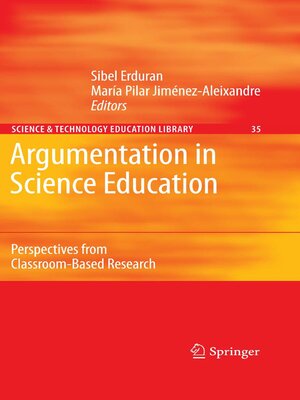Argumentation in Science Education
ebook ∣ Perspectives from Classroom-Based Research · Contemporary Trends and Issues in Science Education
By Sibel Erduran

Sign up to save your library
With an OverDrive account, you can save your favorite libraries for at-a-glance information about availability. Find out more about OverDrive accounts.
Find this title in Libby, the library reading app by OverDrive.



Search for a digital library with this title
Title found at these libraries:
| Library Name | Distance |
|---|---|
| Loading... |
Our conversations about arguments began in Nashville in the Spring of 1996 in Richard Duschl's doctoral seminar that we were both attending, Marilar Jiménez-Aleixandre as a visiting scholar at Vanderbilt University. Jiménez-Aleixandre and Duschl were designing authentic problems in genetics for the University of Santiago de Compostela-based RODA project aimed at engaging high school students in argumentation. Erduran and Duschl had been working on Project SEPIA extending their work in Pittsburgh schools to the design of curricula that support epistemological aspects of scientific inquiry including argumentation. In that spring we attended a NARST s- sion in St Louis, where Gregory Kelly, Steven Druker and Catherine Chen presented a paper about argumentation. As a consequence, a symposium about argumentation was organised (possibly the first of its kind) at the 1997 NARST meeting in Chicago, including papers from Kelly and colleagues and from Jiménez-Aleixandre, Bugallo and Duschl. The symposium was attended, among others, by Rosalind Driver, who had just submitted an application for funding of an argumentation project based at King's College London, a project Erduran would incidentally work on after Driver's untimely death. From this time frame in the 1990s to the present day, argumentation studies in science education have increased at a rapid pace, from stray papers for which we were unable to find an appropriate strand in a conference, to a wealth of research base exploring ever more sophisticated issues.







